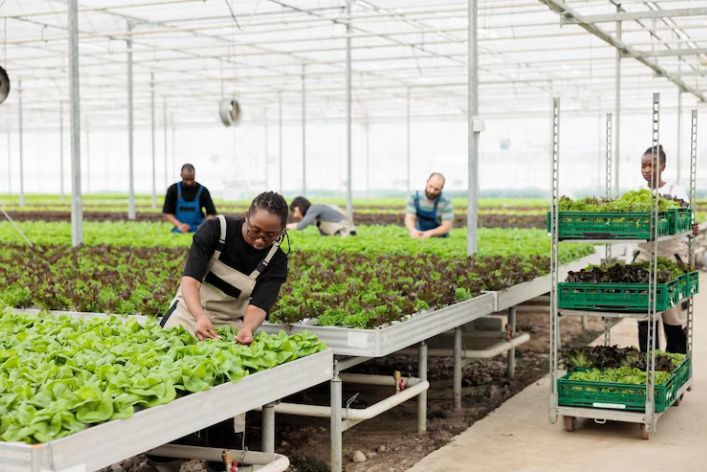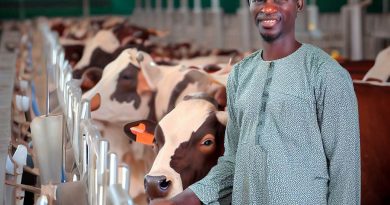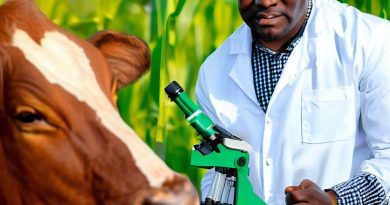Seed Production Careers: A Growth Sector in Nigeria
Last Updated on July 7, 2023
Introduction
Seed production is a crucial aspect of agriculture as it determines crop productivity and yield. The Nigerian seed industry is rapidly growing and has the potential to create employment opportunities.
In this blog post, we will discuss the importance of seed production in agriculture, give an overview of the Nigerian seed industry, and explore the potential for growth in seed production careers.
The Importance of Seed Production in Agriculture
High-quality seeds are critical for achieving crop productivity and yield. Seed production involves the selection and breeding of desirable plant traits, such as disease resistance and high yield.
Seed companies play a critical role in developing, producing, and distributing quality seeds that meet farmers’ needs. The availability of high-quality seeds is essential for improving food security, reducing poverty, and boosting economic growth in Nigeria.
Overview of the Nigerian Seed Industry
The Nigerian seed industry is developing at a rapid pace. The National Agricultural Seeds Council (NASC) is the regulatory body responsible for overseeing the seed industry in Nigeria.
The NASC has established regulations for seed production, certification, and distribution.
Currently, the Nigerian seed industry is dominated by small-scale farmers who produce seeds for their consumption. However, commercial seed companies are emerging and targeting both local and international markets.
The Potential for Growth in Seed Production Careers
The growth potential for seed production careers in Nigeria is enormous. The country has an abundance of land suitable for agriculture, which makes it an ideal location for seed production.
In addition, the government is actively promoting agriculture and investing in the seed industry. As the demand for high-quality seeds grows, so will the need for professionals in seed production.
Seed production careers include plant breeding, seed production, seed testing, and seed marketing. These careers offer opportunities for both technical and non-technical professionals.
The Nigerian seed industry is a growth sector with enormous potential for creating employment opportunities.
As the country continues to focus on improving agriculture, the seed industry will play a critical role in achieving food security and economic growth. Seed production careers, although still emerging, offer excellent opportunities for individuals passionate about agriculture and the environment.
Read: An Overview: Agri-Marketing Jobs in Nigeria
The State of Seed Production Careers in Nigeria
Current Job Opportunities in the Nigerian Seed Industry
The Nigerian seed industry is experiencing significant growth, which has led to an increase in the demand for skilled professionals.
There are various job opportunities in the sector, ranging from research and development, seed breeding, to seed production and distribution.
Companies such as Notore, TechnoServe, and Pro-Seed Nigeria Limited are some of the top players in the sector, providing employment to thousands of individuals.
Recent Developments and Market Trends in the Industry
There has been a significant shift in the seed industry in Nigeria in recent years. The sector has become more focused on providing high-quality and specialized seeds that meet the needs of Nigerian farmers.
One of the major developments is the introduction of hybrid seed technology, which has helped increase crop yields and improve food security in the country.
Moreover, with the government’s commitment to the agricultural industry, the seed industry has seen significant investments in research and development.
There is a growing interest in the production of biofortified crops, which are nutrient-dense and have the potential to address malnutrition in Nigeria.
Academic Qualifications and Skills Required for a Career in Seed Production
To succeed in the seed industry in Nigeria, individuals need to possess academic qualifications and skills relevant to the sector.
A bachelor’s degree in fields such as agronomy, plant breeding, genetics, horticulture, or seed science is a minimum requirement. A master’s or Ph.D. may be necessary for more advanced positions.
In addition to academic qualifications, individuals need technical skills such as knowledge of seed development, breeding, and testing. Communication skills are also essential, as professionals in the seed industry need to interact with farmers, government agencies, and other stakeholders.
Moreover, individuals need to stay updated with the latest developments and innovations in the seed industry. They must keep up with advances in seed technology, production techniques, and market trends to make informed decisions.
In general, the seed industry in Nigeria is a growing sector that offers numerous job opportunities for young and talented individuals.
With the increasing demand for specialized and high-quality seeds, coupled with the government’s commitment to the agricultural sector, the industry is poised for greater growth in the coming years.
Individuals interested in a career in seed production should possess academic qualifications, technical skills and stay updated with the latest developments in the industry.
Read: Insight into Nigeria’s Agricultural Education Careers
Career Opportunities in Seed Production
Seed production is a vital sector in the agricultural industry. It plays a significant role in ensuring food security and rural development. As a result, there are various job opportunities available in seed production in Nigeria. Some of the roles and job descriptions in seed production include:
Seed Production Manager
A seed production manager is responsible for overseeing seed production processes and ensuring that all procedures comply with regulations.
They also manage staff and ensure that production targets are met. To become a seed production manager, you require a degree in agriculture or a relevant field.
Seed Production Coordinator
A seed production coordinator is responsible for planning and coordinating seed production activities. They also liaise with stakeholders to ensure that production is efficient. To become a seed production coordinator, you require a bachelor’s degree in agriculture or a related field.
Seed Production Technician
A seed production technician assists in the seed production process, including planting, harvesting, and processing.
They also perform quality control measures. To become a seed production technician, you require a diploma or an associate degree in agriculture or a relevant field.
Research and Development Officer
A research and development officer provides technical support in seed production research and development projects.
They also develop and implement research protocols. To become a research and development officer, you require a graduate degree in the field of agriculture, genetics, or plant breeding.
Seed Analyst
A seed analyst tests and examines seeds to ensure that they meet quality standards. They also conduct quality control tests to determine seed viability. To become a seed analyst, you require a degree in agriculture or a relevant field and certification in seed analysis.
The skills and experience required for the different seed production jobs vary according to job descriptions. However, the generic skills required include strong communication and organizational skills, attention to detail, and knowledge of seed production principles and practices.
The salaries and remuneration figures for seed production jobs in Nigeria vary widely according to job title, level of education, and years of experience.
However, the average salary for a seed production manager ranges from NGN 200,000 to NGN 500,000 per month. A seed production coordinator earns an average salary of NGN 150,000 to NGN 300,000 per month, while a seed production technician earns an average of NGN 80,000 to NGN 150,000 per month.
A research and development officer earns an average of NGN 350,000 to NGN 500,000 per month, while a seed analyst earns an average of NGN 120,000 to NGN 200,000 per month.
In essence, seed production is a growth sector in Nigeria with numerous job opportunities. Different roles in seed production require different levels of education and experience. However, they all require a passion for agriculture and a commitment to ensuring food security and rural development.
Read: Nigeria’s Dairy Industry: Exciting Career Prospects
Skill Development and Training Opportunities for Seed Production Careers
The seed production industry in Nigeria has grown rapidly in recent years, creating a demand for skilled professionals in the field. To meet the needs of this expanding sector, various training opportunities have been developed for those seeking careers in this area.
The State of Vocational and Academic Training for Seed Production Careers
There are several vocational and academic training options available to individuals interested in pursuing careers in seed production. Vocational training programs, such as apprenticeships and on-the-job training, provide hands-on experience and practical skills in seed production.
Academic training opportunities are also available in universities and colleges, offering programs in agriculture, seed science, and botany.
Despite the availability of these training options, many aspiring seed producers in Nigeria lack access to formal vocational and academic training due to financial constraints or limited opportunities in their localities.
This results in a shortage of skilled professionals in the industry, making it difficult for the sector to meet the growing demand for high-quality seeds.
Private Sector Interventions in Skill Development
The private sector in Nigeria has recognized the importance of investing in skills development to address the shortage of seed production professionals.
Many seed companies have established training programs and partnerships with vocational and academic institutions to provide practical training and skill development opportunities to interested individuals.
For instance, some seed companies offer internships and apprenticeships to young people who want to learn the skills needed in seed production. Others sponsor workshops, seminars, and training sessions on various aspects of seed production, including crop cultivation, breeding, and processing.
Collaborative Efforts between the Public, Private, and Non-Profit Sectors
Collaborative efforts between the public, private, and non-profit sectors have been instrumental in addressing the skills gap in the seed production industry in Nigeria. Government agencies, private seed companies, and non-profit organizations have joined forces to provide skill development training and education to aspiring seed producers across the country.
For example, the Nigerian government has partnered with private seed companies to establish vocational training centers in various regions of the country.
These centers offer training programs in seed production, crop management, and marketing, among others. Non-profit organizations have also played a vital role in skill development through mentorship and training programs for young people interested in pursuing careers in the industry.
The seed production industry in Nigeria is a growing sector that presents countless opportunities for individuals seeking careers in agriculture. With the increasing demand for high-quality seeds, there is a need for skilled professionals in the industry who can produce and cultivate these essential crops.
Fortunately, several vocational and academic training opportunities exist for aspiring seed producers, and private sector interventions and collaborative efforts between different sectors are helping to address the skills gap in the industry.
Read: Career Spotlight: Veterinary Services in Nigeria

Promoting Sustainable Seed Production
- The role of seed production in sustainable agriculture.
- Sustainability practices in the Nigerian seed industry.
- Creating awareness and promoting sustainable seed production practices.
Seed production is one of the essential components of sustainable agriculture. The availability of quality seeds is critical for crop yield and product quality.
Furthermore, sustainable seed production practices promote the conservation and utilization of genetic resources and enhance biodiversity. In Nigeria, the seed industry is growing rapidly, but there is still a need to promote sustainable practices in the sector to achieve long-term benefits.
The Role of seed production in sustainable agriculture
Seed production plays a crucial role in the sustainability of agriculture. The quality of seeds determines crop yield and product quality. Farmers need access to high-quality seeds to produce better crops, which in turn contributes to food security.
Moreover, quality seeds can resist pests and diseases and adapt to different climatic conditions, which ultimately enhance agricultural productivity and reduce the environmental impact of farming activities.
Sustainability Practices in the Nigerian seed industry
The Nigerian seed industry has made significant progress in recent years, with the government implementing policies to improve the sector.
However, sustainability practices are crucial to ensure a continuous supply of quality seeds and environmental conservation. Some of the sustainability practices in the Nigerian seed sector include:
- Conservation of genetic resources.
- Use of organic fertilizers and pesticides.
- Promotion of crop diversification.
- Adoption of climate-smart technologies.
These practices help to reduce the environmental impact of farming activities and increase the productivity of crops. Moreover, sustainable practices promote the conservation of genetic resources, which are critical for the development of new crop varieties.
Creating awareness and promoting sustainable seed production practices
Creating awareness and promoting sustainable seed production practices is essential to ensure the long-term sustainability of the Nigerian seed sector. Some of the ways to promote sustainable seed production practices in Nigeria include:
- Training farmers on good seed production practices.
- Promoting the use of quality seeds.
- Encouraging the adoption of sustainable farming practices.
- Creating incentives for farmers to adopt sustainable practices.
- Providing access to information on sustainable seed production.
These measures are critical to promoting sustainable seed production practices. By educating farmers on good seed production practices and creating incentives for them to adopt sustainable practices, the quality of seeds will improve, enhancing agricultural productivity and contributing to environmental conservation.
Promoting sustainable seed production practices is necessary to ensure the long-term sustainability of agriculture in Nigeria.
By encouraging the adoption of sustainable practices in the Nigerian seed industry, farmers will have access to high-quality seeds, and there will be environmental conservation.
The government and other stakeholders must take action towards promoting sustainable practices in the seed sector to achieve long-term economic, social, and environmental benefits.
Conclusion
The Nigerian seed industry has immense potential for growth, which can result in improved food security and economic development.
However, this can only be achieved through the continuous development of seed production careers. It is crucial to invest in sustainable seed production practices that will ensure the availability of high-quality seeds for farmers.
There is a need for supportive policies and strategies that will incentivize private sector involvement in seed production.
In addition, there should be collaborations between research institutes and seed companies to ensure that relevant research and innovations are incorporated into seed production practices.
Furthermore, the government should provide an enabling environment for a robust seed industry. This includes the provision of infrastructure such as good roads, electricity, and water supply, and adequate funding for research and development of plant varieties tailored to local conditions.
Ultimately, sustainable seed production is crucial for the realization of Nigeria’s agricultural potential.
The government and private sector actors must work together to create an enabling environment that will promote the growth of the Nigerian seed industry, thus contributing to the overall growth of the country’s economy.


